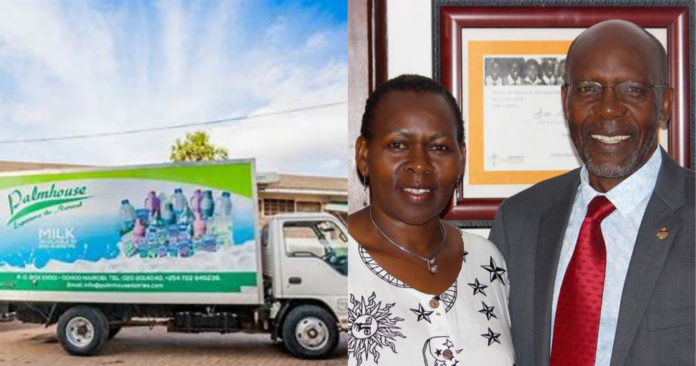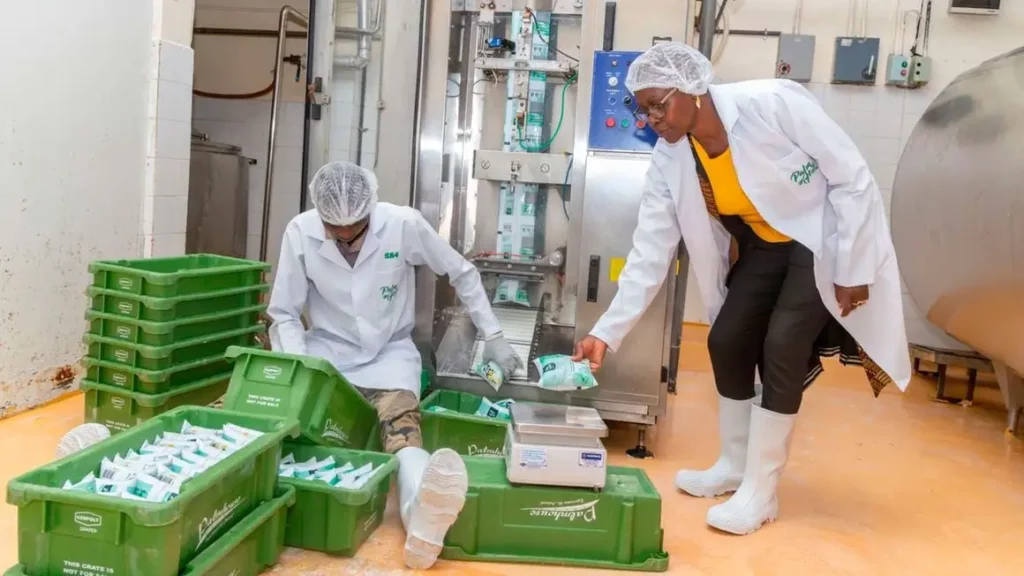Margaret Munene and Eric Kimani are the couple behind Palmhouse Dairies, a Kenyan household milk producer. The couple started keeping dairy cows in the 90s. Their vision was to have their home supplied with adequate milk.
This small side business they set up turned out to be a multi-million business in the future following the collapse of milk processors such as KCC, which had monopolized the industry. But the journey to the top has definitely been cumbersome yet very fruitful.
Eric Kimani is a prominent Kenyan businessman and philanthropist who has served in several high capacities in the country. He received the Volunteer of the Year Award in 2008 and the Moran Burning Spear in 2011.
His wife, Margaret Munene, is a Bristol University-trained Bacteriologist who worked at the Kenya Agricultural Research Institute (KARI), present-day KALRO. She quit her job as a KARI scientist to venture into the dairy business full-time as the Managing Director.
Aside from establishing PalmHouse Dairies, the couple also initiated Palmhouse Foundation, an education trust that finances students from needy backgrounds.
They are also the brains behind Harvest Consulting Limited, which is a real estate and property agency
Starting Palmhouse Dairies
In the initial setup of Palmhouse Dairies, the couple started with a small number of dairy animals. A few years later, the number of dairy cows increased, subsequently producing large amounts of milk.
“After some time, I realised the milk was a lot even after giving it out. Since the cows were consuming quite some money for feeding and care, we decided to take the milk to the nearby Githunguri Dairy Cooperatives Society,” she said.
Githunguri cooperative was not paying the couple enough to cover expenses. Her coworkers at KARI advised her to sell the milk personally instead of donating it to the Cooperative.
At first, Margaret Munene had doubts about supplying raw milk in large quantities to customers, considering the costs and challenges involved. But she gradually began to distribute it.
“I sold it to my friends and Githunguri Cooperatives Society and after a couple of years, we would have about 300 litres of milk in the car boot,” she recalled.
Since the couple were commuters from Ruiru to Nairobi daily, they would carry milk in the car boot. First, they’d drop off their three children at school, then start selling the milk to clients in Nairobi and by 8 am, each would be in the office ready to start the day’s work.
At the time, both were still in formal employment. It didn’t take long before the pair realised that running a farm is very demanding. They opted to employ staff with dairy farm expertise to manage their small business.
“My husband was very helpful and has always been hands-on so we ran the dairy farm together. It was not easy but doable,” Margaret explained.
Quitting Formal Employment
Margaret Munene quit her job at KALRO after noting that she was making more from her side business. She was also not satisfied with the nature of her job, as she termed it ‘not exciting’ thus compelling her to resign.
Her husband, Eric Kimani, worked as the Chief Executive Officer (CEO) of Sameer Group.
“I was not finding satisfaction in my work, so in 1995 after working for nine years, I decided to quit and become a dairy farmer and milk hawker while my husband who had a better job, continued working,” she said.
She also decided to stop supplying milk to Githunguri Cooperatives Society and instead sell all the milk to customers directly in Nairobi, as the demand was high.
The family car was too small to meet the demand, so they purchased a pickup and hired a driver to deliver the milk. For one and a half years, she hawked milk with the help of her farmhands.
At the time, the Kenya Creameries Cooperative (KCC) that had dominated the market struggled to pay its farmers and meet market expectations. The liberalisation of the dairy sector urged her and her husband to start their own milk company, Palmhouse Dairies.
As an agriculturalist and research scientist, Margaret understood that processed clean milk was better than raw milk.
“We toyed with the idea for a year while saving some money. We wrote a project paper to source funds to start a dairy processing company,” she remembered.
Set out to look for funds, Margaret could have easily despaired as no help was coming, even after using a payslip as collateral.
“It wasn’t like today where everybody wants to give you money. Nobody could fund us but eventually, a family friend told us that the European Investment Bank (EIB) was supporting SMEs through KCB and we could use that.”
The couple submitted their project proposal to KCB and got a loan with a one-year grace period. Thereafter, they travelled to Belgium and purchased their first milk processing machine which was set up within a few months.
In 1997, their company processed 400 litres of milk daily.
“Luckily for us, KCC was already on its death bed, could not pay farmers or source raw milk so we had a lot of milk supplies. We went into business promising to pay them on time,” she noted.
This plan turned out to be a gem, despite walking into uncharted grounds knowing that it could backfire on them anytime. Ms Munene states that she was not afraid of failure and was only anxious when she quit her job at KARI.
She says that Palmhouse Dairies treated milk suppliers as partners, not just farmers, which has made the business grow. She also attributes the business’s success to persistence.
“We have been very persistent and determined; there were times when business was very difficult, the dairy industry is not easy but I was sure I was going to succeed,” she concluded.
As a parting shot to entrepreneurs, she says that one must have courage and prepare well, be organised and careful about what they have in mind.
“Know your strengths and most importantly, have some savings.”
“Being in business is wonderful because you become your employer and much as it is very taxing, especially at the beginning, you are your boss and your time is your own,” she stated.
The company has expanded over the years to become one of the top milk distributors. It produces 10,000 litres of milk daily and supplies institutions and corporate organizations.
Nairobi Serena Hotel, Java House, Nairobi Hospital, Windsor Golf and Country Club, and Muthaiga Country Club are among their clients. Aside from milk, they also make Yoghurt and Mala.











Fantastic, insightful, аnd efficient